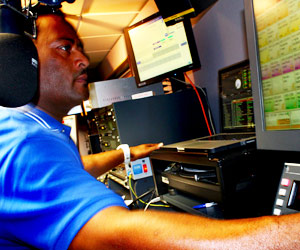The “Dom-Jam” DJ

Robbo Ranx describes himself as a “Dom-Jam” – born in Britain to a Dominican mother and a Jamaican father.
His show Dancehall with Robbo Ranx runs weekly on the BBC’s urban music station Radio 1Xtra which recently, for the first time in its decade-long history, pulled in more than a million listeners, according to February 2012 Rajar figures.
Robbo Ranx is now in his 10th year with his BBC show and has in recent years started to spread his wings to projects outside of the BBC for stations in Africa and the Caribbean.
Caribbean Intelligence© asked him the question we’ve been asking all our diaspora guests: how much they feel a part of the society they live in and how Caribbean they feel.
Caribbean abroad
“I feel both. It’s difficult to say. When I’m up against it, I feel Caribbean abroad,” Robbo said.
He admits to feeling different when he’s liming with his cousins in Jamaica. He also points out that, when he opens his mouth in Jamaica, everybody reminds him of his origins: “People shout, ‘Hey British’,” he says with a smile on his face.
“When I’m here [in the UK], I feel Caribbean abroad. When I go to the Caribbean, I feel British. They always remind me.”
Robbo adds: “I‘ve got no problem with it. I’m a world man. I’m grateful.”
Jamaican festivals
When we caught up with Robbo, he was just back from one of his regular trips to Jamaica, where he attends major music festivals and interviews the movers and shakers in Jamaica’s music world for broadcast on his BBC and other programmes.
His love of urban music comes across in his every sentence. He talks of his early years in London and his first visit to Jamaica, where he instantly developed a “massive, massive love of Jamaican music”.
He says of his first visit to Jamaica as a kid: “It really changed me as a person.”
He visits Jamaica in particular at least once or twice a year: “To be up on the changes in the music, you have to be there. It’s gotta be felt street upwards... You can’t do that online.”
He speaks fondly about the social commentary in Jamaican music. His recent visit to Jamaica exposed him to the huge amount of music referring to "Mama P", as the country's leader is now widely known.
He said he was impressed at what a high profile Jamaica’s Prime Minister, Portia Simpson-Miller, seems to have with people in the music industry.
“Social commentary is what the music is about,” he reflects.
ADVERTISEMENT
Global music trends
His show on the BBC and for other stations involves what he describes as less talking and more music. It includes a mix of urban music – from dancehall foraged during trips to Jamaica to the increasingly popular Afrobeats music popular in London clubs.
He recalls the same sense of pride in discovering artists such as Beenie Man and Shabba Ranks in the 1990s. He remembers how young people of both Caribbean and African origin in the UK got into Jamaican dancehall and enjoyed it with no small amount of black pride.
He says that five years ago, the African clubgoers in London started to show their pride in Afrobeats music from West Africa.
Today, he says, young people of African and Caribbean origin see it as the “hottest club scene music in the UK”. In fact, he heard it during his May visit to Jamaica in local clubs.
The crossover of urban music from Kingston to Kenya has put Robbo in a position of being in demand with a diverse range of radio stations in a number of countries. Among his projects, he currently produces an urban music programme for Nairobi’s Homeboys FM station, while his new show for a station in St Lucia is due to start soon.
'Yearning'
For him, like many in the diaspora, working with his Caribbean links is a way to feel back at home.
Robbo admits that the hardest transition is settling back to life in London after a visit to Jamaica: “I came back last week and I’m yearning to be there now.“
“Life has got soul,” he said about Jamaica. OK, so it was a grey rainy day in London and maybe not a good day to ask somebody about a recent visit to Jamaica.
“I have to sit around music," he says. "You couldn’t play that sort of music and not think of the source.”
Caribbean Intelligence© asked the obvious question anyone in the Caribbean would ask – why not relocate?
Robbo’s response: “Commercial radio in Jamaica, it changes rapidly... That stability that I’m used to, I don’t know if I’d be able to find it. I’ve got to work with what I’m blessed with.”
'Underserved' music
Robbo's urban music work comes out as a passion for the Caribbean, with a duty to spread the word through the UK, as Radio 1Xtra increasingly reaches out to audiences beyond black Britain.
“[I have] a duty to provide a music that’s underserved here in the UK,” he told Caribbean Intelligence.
Beyond the BBC, Robbo has had offers to do similar shows for stations in Barbados and Bermuda. He says he’s still “finding that niche”. But his passion for music is not contained to DJ-ing and producing regular music shows.
In fact, Robbo Ranx has become a manager in recent times, taking a young British singer, Lea-Anna, under his wing, as what he calls his “pet project”. She is now on her second single with Robbo as producer.
“I’ve always had a way with artists,” he says, adding that he found she had so much talent, he wanted her to go public.
The love of music always brings Robbo back to that sense of being Caribbean abroad. So ultimately, does he feel Caribbean abroad or black British?
“You can be first, second, third, even fourth-generation...you still need that sense of belonging.”
Website: www.djrobboranx.com
ADVERTISEMENT
